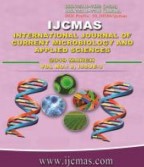


 National Academy of Agricultural Sciences (NAAS)
National Academy of Agricultural Sciences (NAAS)

|
PRINT ISSN : 2319-7692
Online ISSN : 2319-7706 Issues : 12 per year Publisher : Excellent Publishers Email : editorijcmas@gmail.com / submit@ijcmas.com Editor-in-chief: Dr.M.Prakash Index Copernicus ICV 2018: 95.39 NAAS RATING 2020: 5.38 |
The Terminalia arjuna (Roxb.) Wight & Arn. (Combretaceae) is an important commercial crop in India. It has been utilized as a primary food for rearing of the tropical tasar silkworm, Antheraea mylitta by the rural and tribal people in India as a livelihood practice. Due to its continuous utilization for rearing of silkworm, majority of the T. arjuna block plantations have been showing sickness and susceptible for variety of pests and diseases. The present study was intended to assess the status of soil arthropods and physical parameters in the natural and block plantations at Bilaspur regions in Chhattisgarh. The study revealed soil arthropods catches in pitfall traps was significantly more compared to Berlese funnel. The Number of insect order recorded in the natural ecosystem of T. arjuna was more compared to T. arjuna Block plantation at Bilaspur and Kargi Kota. In the natural ecosystem of T. arjuna, a total of 104 specimens, belonging to 15 different orders were recorded. At T. arjuna Block planation Bilaspur and Kargi Kota, a total of 104 and 244 specimens, belonging to 11 and 12 different orders were recorded, respectively. Soil physical characters assessed in the natural ecosystem were more ideal compared to block plantation. Our results suggested that substantial variation in soil arthropods and physico-chemical properties between natural and block plantation of T. arjuna ecosystems.
 |
 |
 |
 |
 |